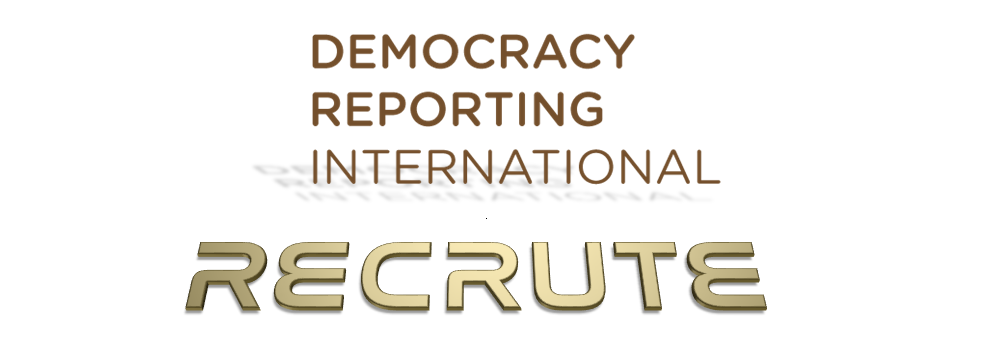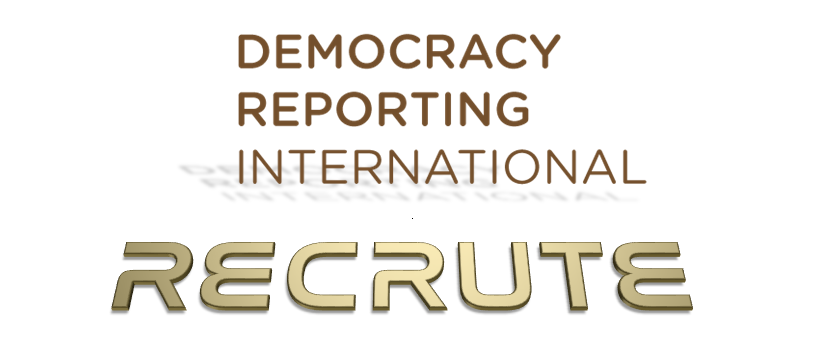DRI /// RECRUTE ::: Institutional communication expert – Tunisia (m/f)
I. Context
The Tunisian Constitution adopted in 2014 recognizes access to justice as a human right. Chapter V of the Constitution is dedicated to judiciary authority and endorses every citizen’s right to access justice. The level of access to justice is directly linked to the capacities of the courts to communicate with citizens and the public. Effective communication management, relations with the media and the ability to communicate the content in a way that is adjusted to the wide spectrum of situations and audiences are fundamental in developing and maintaining the public trust vis-à-vis the judiciary. The courts’ communication remains equally important to protect the rights of litigants, to use their means in the most effective way and to guide them through the procedures and requirements in a way that facilitates the mission of the courts. Communication also plays an important role in extraordinary or emergency situations, including media attacks on the courts, where the judiciary needs to manage the communication in a careful and strategic manner. The judges need to be able to respond to the attacks in a comprehensive way while ensuring speaking with one voice and using an approach that connects them to the average citizen or media news consumer rather than only to legal experts. The communication capacities of the courts can be enhanced by technical means, strategic advice, improving internal organisation, building the individual communication capacities of judges, and the provision of deontology codes and other instruments. Effective communication is a key instrument for protecting judicial independence and influencing how the judiciary is perceived, hence protecting its reputation whenever needed and justified.
The Tunisian judges confirm and emphasise the importance of enhancing the communications capacities of the courts and the judiciary, as well as the need for more direct contact with citizens to increase their awareness on access to justice and the work and challenges related to reforms of the justice system. Such capacities are particularly important since the legal reforms aimed at implementing the Constitution by establishing mechanisms protecting the independence of the judiciary should go hand in hand with awareness-raising actions. Currently, the communication capacities of the courts are weak, hence it is difficult for the judiciary to inform about on-going reforms, but also day-to-day issues related to delivering justice. Similarly, the courts and judges remain vulnerable in cases of media attacks, as they have insufficient capacities to strategically defend themselves in these situations.
The Administrative Tribunal (AT) currently has a spokesman, who mainly communicates with the media during the election period (the AT plays a critical role in the electoral disputes resolution system). There is also a recently created communication unit composed of four judges which is responsible for overall communication, preparation of publications and simplification of the legal information disseminated. The Tribunal uses its official Facebook page for external communication: https://www.facebook.com/Tribunal.Administratif.tn/?fref=ts.
However, all these positions and structures are not fully functional yet and require considerable capacity-building assistance, means and support to render them effective. Similarly, the individual capacities of judges to communicate with citizens and the media are low, as they have never needed to strengthen these skills in a judiciary which enjoyed a very privileged position in the country. At the same time there seems to be an understanding among judges regarding the importance of strengthening their communication and the fact that in the recent years judicial authorities have lost a lot of reputation among citizens. On the other hand, based on the feedback DRI received during outreach meetings in the regions, it was equally clear that citizens are keen to receive more information from the courts, yet provided in a simplified format more accessible to non-lawyers.
In order to contribute to addressing these challenges DRI is looking for an expert on institutional communication who will undertake an assessment of institutional and individual communication needs of the Administrative Tribunal and the administrative judges, and, based on this assessment, will propose a plan for providing support in developing the external communication capacities of the AT.
II. Expected output
The objective of this assignment is to produce an assessment of the communication needs of the Administrative Tribunal and to propose a plan for addressing these needs through strategic and coordinated support to developing the institutional capacities and individual skills of the Tribunal and its judges with regards to external communication. Through this approach the assignment will contribute to improving access to justice in Tunisia.
III. Tasks and deliverables
Under the direct supervision of DRI Tunisia’s Country Director, the Contractor will contribute to the three workshops and a seminar in the following way:
The consultant will work directly with the Administrative Tribunal and in communication with other relevant stakeholders and will carry out analysis based on the desk review of the documents, interviews, phone calls and small groups workshops.
The scope of the tasks of the consultants will include:
- Analyse the existing legal framework of the AT and other relevant external and internal documents pertinent to its mission and existing internal and external communication procedures in order to identify the communication requirements;
- Carry out an analysis of the current institutional internal and external communication structures and processes;
- Review and evaluate the roles, capacities and skills of the judges and staff currently responsible for the external communication of the AT;
- Hold interviews and consultations with representatives of the AT and other relevant stakeholders;
- Conduct a SWOT analysis of the internal and external communication framework at the AT;
- Undertake a communication stakeholder mapping given the role and the mandate of the AT;
- Prepare a needs assessment report and corresponding strategy and action plan of the support to be provided, based on the needs assessment, to the AT in the process of developing its internal and external communication capacities;
- Prepare a list of expected challenges or obstacles which may negatively influence implementation of the strategy and propose solutions;
- Provide a monitoring and evaluation plan of the strategy in order to follow its implementation;
- Prepare a list of the resources (human, equipment others) needed to implement the strategy of support to developing the communication capacities of the AT;
- Facilitate two working sessions with the representatives of the AT as part of the assessment and preparations of the support strategy (introductory/planning and presentation of the draft final report/validation).
Deliverables:
- Inception report in English or French including workplan and methodology of the assignment – max. 1 working day/deadline: 3rd day of the assignment. The inception report is to be approved by the DRI Country Director;
- Draft report in English or French of the needs assessment – max. 8 working days/deadline: 25th day of the assignment. The report is to be approved by the DRI Country Director;
- Draft report in English or French of the plan for supporting development of the communication capacities of the Administrative Tribunal – max. 2 working days/deadline: 30th day of the assignment. The report to be approved by the DRI Country Director;
- Final report in English or French and in Arabic including the needs assessment and the plan – max. 4 working days/deadline: 40th day of the assignment. The report is to be approved by the DRI Country Director;
IV. Duration of the assignment
The consultant will be contracted for the period from 1st February 2018 till 25th March 2018 with a total maximum number of 15 working days. The working days will include home base work and mission days in Tunisia.
V. Qualifications and competences
- University degree in communication, telecommunication, ICT or related;
- 10 years of experience working on institutional internal and external communication, ideally from a capacity-building perspective;
- In depth knowledge of communication strategies and technologies;
- Experience advising judiciary, members of parliament, government and senior representatives of authorities as well as with civil society;
- Pervious experience working in the Arab region and drafting communication related documents in Arabic;
- Experience in facilitation and delivering trainings on techniques of communication;
- Ability to provide written and oral concise analysis, develop documents;
- Fluency in spoken and written Arabic as well as either French or English.
DRI values diversity and aims to be an equal opportunities employer.
Interested applicants should send their applications (CV and cover letter) to [email protected] including ‘Institutional Communication Expert” in the subject line.
Closing date for applications: 24 January 2018.
The position may be filled before the end of the deadline, so early applications are encouraged.
Only shortlisted candidates will be notified.


